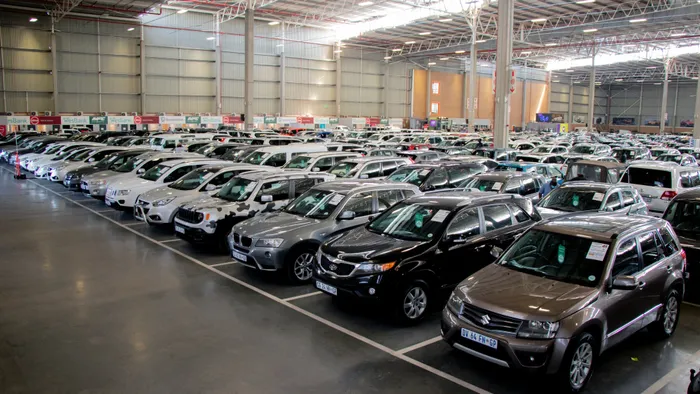WeBuyCars launches Bid to Finance - Here are all the details

WeBuyCars has launched Bid to Finance, a new service, which gives consumers the option to finance cars purchased on auction. File Image: IOL
TRANSACTION Capital’s shares leapt 9 percent in intraday trade yesterday after chief executive David Hurwitz issued an upbeat trading update celebrating WeBuyCars’s growth trajectory, but warned that the high oil price was effecting participants in its SA Taxi business.
The statement was release ahead of the firm’s annual general meeting to be held today.
Hurwitz said the company’s performance in the first four months of the 2022 financial year had been strong and in line with the company’s expectation.
“Although the Covid-19 pandemic continues to redefine the global operating context, the group’s historic growth trend resumed during 2021.
“By the end of the 2021 financial year, our divisions had largely recovered to pre-Covid levels of business activity and earnings growth,” Hurwitz said.
He flagged that Transaction Capital expected headline earnings per share in full year 2022 to exceed the prior years heps at a rate higher than pre- pandemic growth rates, supported by a continued steady recovery by SA Taxi, and high-growth earnings from WeBuyCars and Transaction Capital Risk Services (TCRS).
Transaction Capital’s results for the half year ending March would be released on May 18.
He said Transaction Capital had springboard opportunities to accelerate earnings growth in the short to medium term, including international expansion through TCRS and WeBuyCars, where the company was able to leverage its home-grown competencies and rand-denominated resources to grow organically.
“This spread of opportunity will enable us to further diversify our revenue and risk profile to yield higher growth and deeper resilience,” he said.
Looking at WeBuyCars, a trader of used vehicles through its vertically integrated e-commerce and physical infrastructure, offering finance, insurance and other ancillary products, Hurwitz said the outlook for the used vehicle market in South Africa was “resoundingly positive”.
Structural support for the resilience and future growth included cash-strapped consumers trading down to less expensive used vehicles, a trend given momentum by the economic implications of Covid-19.
“Further, the recent microchip shortage and supply chain disruptions have affected the global supply of new vehicles, an added tailwind for the used vehicle sector,” he said.
In the first four months of full year 2022, the volumes of vehicles sold per month at WeBuyCars was just under Transaction Capital’s 10 000 short-term target, been driven in part by the expansion of WeBuyCars’ physical footprint.
During the past three months, the company had launched its largest vehicle supermarket at the Dome, in Johannesburg, with a total capacity of 1 400 bays, and a smaller dealership in Polokwane with 175 bays.
This formed part of its geographic expansion strategy to establish physical dealerships across South Africa, augmented by its newly designed buying pods, located in high traffic areas such as shopping centres.
Online sales remained at 30 percent of total monthly sales.
This as WeBuyCars yesterday launched Bid to Finance, a new service, which gives consumers the option to finance cars purchased on auction.
“Bid to Finance brings two significant improvements to private buyers. Firstly, access to finance as consumers are often reluctant to participate in online auctions because of the unavailability of finance, or because they are intimidated by the auction terms and conditions and secondly, a warranty,” WeBuyCars said in a statement.
In Transaction Capital’s other vertical, Hurwitz said SA Taxi had steadily come through the worst impacts of Covid-19, demonstrating the resilience of the business and the industry at large.
Retail prices for minibus taxis had risen 3.5 percent between October 2021 and January 2022.
But Hurwitz warned that at the end of 2021, the 12-month average for petrol and diesel prices were 19 percent and 17 percent higher than a year ago, with the petrol price breaking the R20 per litre level.
“Petrol prices are expected to increase further in the coming months, driven by international oil price increases.
“Russia’s military action in Ukraine could push international oil prices up even higher, compounding the increases in local fuel prices.
“We are tracking this situation and the potential impact it may have on the affordability of our operators,” he said.
Minibus taxi fares had increased on average 9.3 percent per year since 2013, to absorb these financial effects.
With the number of trips and passenger loads down due to the impact of Covid-19, the industry’s profitability was under strain and further fare increases might be needed, he said.
Although commuter activity was increasing as economic activity in South Africa increases post-Covid, in the short-term it was not expected to reach levels experienced prior to the pandemic.
Looking at Transaction Capital’s TCRS, Hurwitz said it had made significant progress in shifting its business model to focus on three core service offerings; collection services, transactional services and business process outsource services.
In the first quarter of full year 2022 more non-performing loan (NPL) portfolios came to market in South Africa with TCRS’s investment activity on track to exceed 2021 levels.
“We see this trend continuing as the impact of Covid-19 plays out over the medium term.
“As household income erodes and the number of consumers in debt increases, the pressure on consumer-facing businesses will increase as their credit portfolios deteriorate.
“This provides more scope for TCRS, as our clients deal with bigger NPL portfolios and the consumers’ impaired ability to service debt,” he said.
BUSINESS REPORT